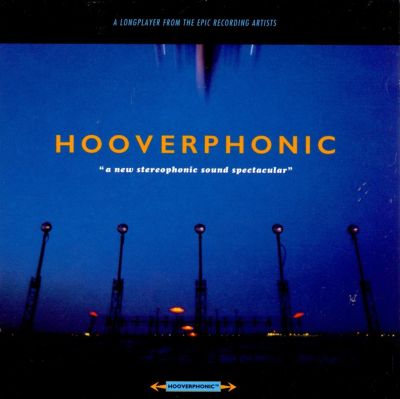Staff Picks for February 2019
February 28, 2019
After Nirvana led to every band in Seattle getting a deal, labels scrambled to strike gold with another city. Somehow that frenzy made it to Halifax, Nova Scotia, where bands like Thrush Hermit got signed to a major, achieved minor radio play across Canada, and made it onto the Mallrats soundtrack. After the boom fizzled they quietly left Atlantic Records and released their final album, Clayton Park, on indie Sonic Unyon. The record has big power pop hooks, is catchier than their debut, and is nearly impossible to find on any streaming service.
February 27, 2019
Various Artists
The sister New Orleans labels Ric and Ron have been anthologized many times over the years but Craft's recent anthology is the best single-disc overview ever assembled.
February 26, 2019
With 1984's Zen Arcade, Hüsker Dü made a stunning leap forward from a better-than-average hardcore band into a trio whose melodic and thematic ambition blew past punk and made them one of America's most exciting underground. While the production is rough, Bob Mould's guitar and the songs written by Mould and Grant Hart were articulate and revelatory, and while they made more precise albums in the future, Hüsker Dü never truly topped it.
February 25, 2019
Showcasing singer Lydia Pense's throaty coo and a powerhouse horn section, Cold Blood always sounded sort of like Janis Joplin fronting Tower of Power. Produced by Stax legend Steve Cropper, 1974's Lydia finds the Bay Area outfit dressing up their dirty bell-bottom R&B with a slick, blue-eyed-soul vibe that's as smooth and tangy as a tequila sunrise on a Saturday evening spent watching boats off the coast of Sausalito.
February 24, 2019
Credited to the Sun Ra Quartet, there are two standards amongst a program of originals, including a stellar version of "My Favorite Things." The music quickly takes its only sharp turn toward outer space with "Moon People," emphasizing synth over piano whereas the lovely "Sun Steps" reverses that. In this small group, solo space is ample for John Gilmore, Ra and Michael Ray, all of whom are in fine form as is Luqman Ali, whose understated drumming holds things together beautifully.
February 23, 2019
This overlooked 2018 gem from Canadian musician and former Miracle Fortress man, Graham Van Pelt, channels Arthur Russell's sunnier dance moments with a strong introspective streak.
February 22, 2019
With the release of Rustin Man's excellent Drift Code, it's time to revisit where it all began. Paul Webb's first album with the project featured Portishead's Beth Gibbons on a set of deeply beautiful songs that blended folk, R&B and jazz in ways that sounded timeless in 2002 and have only grown richer over the years.
February 21, 2019
A gentler entry in Animal Collective's diverse catalog, this collection of lengthy, atmospheric folk was recorded mostly live in semi-improvised sessions on a back porch. Meditative and ambient, this material predicted just one layer of the group's dense, freaked out take on pop that would follow.
February 20, 2019
The third album from the Chilean saxophonist--her first with Crash Trio--is an exercise in hard post-bop wed to finger-popping grooves, Latin jazz, folk sounds, syncopated Caribbean rhythms and samba. Whether ballad, blues, or swinging hard bop, this trio's interplay is canny, soulful and deep.
February 19, 2019
An inventive improvisor in the Kenny Wheeler-mold, Alessi makes modern creative jazz that is aware of tradition, but rarely evinces it. He's well-matched by his partner. The son of John and Alice Coltrane, Ravi Coltrane has spent much of his career bucking obvious comparisons to his iconic father, while conversely living up to his family lineage with his own deeply cerebral style of post-bop. This album follows up Alessi's two previous ECM outings, 2013's Baida and 2016's Quiver, and is the first to feature This Against That since 2011's Wiry Strong.
February 18, 2019
Leaving Ibiza in the rearview, Posner doubles-down on the introspection with his heartbreaking third effort. Named after a devastating line that ends the album, this is Posner reflecting on the loss of his father, a friend, and a relationship, processing his grief in a simple but pure manner. Standouts like the relatively upbeat "Song About You" and "Move On" balance production wonders like "Wide Open" and the tear-jerking "How It's Supposed To Be."
February 17, 2019
Historically, the Weavers were the vital link between the leftist People's Songs movement of the '50s and the folk revival that emerged in the wake of the Kingston Trio in the '50s. Musically, the foursome delivered powerful harmonies and unearthed many songs that would become folk standards. This iconic live album features the Weavers in their pure form, minus the pop arrangements of their early singles, performing their best known tunes in front of a clearly delighted audience.
February 16, 2019
The second studio collaboration from Norwegian composer and producer John Erik Kaada and Faith No More/Mr. Bungle/Fantomas frontman Mike Patton, Bacteria Cult filters the cinematic vignettes of 2004's Romances through a widescreen lens. Bacteria Cult needs a little time to get into your bloodstream before it can be reckoned with, but ultimately, it's an infection worth sweating through.
February 15, 2019
All the oft-underappreciated group's studio albums from the '60s through 2000s, plus loads of live tracks, outtakes, BBC session and rarities. Well worth the hefty price if you are a fan of the band.
February 14, 2019
This delicate and sparsely-arranged 2014 mini-album from the American synthpop duo is beguiling in its intimacy and elasticity, boasting strong melodies and a sophistication that immediately set them apart from others of their ilk.
February 13, 2019
Various Artists
Without question, one of the most innovative albums released this decade. The defining release of the shangaan electro scene (was it actually a scene? are people still making music like this?) consisted entirely of tracks produced by South African visionary Nozinja, and it's filled with breakneck tempos, sticky-sweet melodies, and stunning dance photography. Nothing but joy and excitement to be felt here.
February 12, 2019
One of the last truly great Hawkwind-related albums before the precipitous dip into cliche and pretension, this explored a growing interest in electronics and quirk that had left them teetering on the edge of new wave pop. Opening with the death-defying breeziness of "Psi Power," passing on through the spacious pomp of "Free Fall" and the self-abusing autobiography of "25 Years," the album also dipped into comedy, sci-fi, and bleeping futurism.
February 11, 2019
I celebrated Roxy Music's induction into the Rock & Roll Hall Of Fame by listening to their discography all over again. Each album has plenty to recommend, but I'm finding myself drawn to the art-disco-rock of Manifesto, an album that I've always enjoyed but is finally beginning to click for me.
February 10, 2019
When it landed in the late '90's, Bowie's jungle/UK techno-fixated album was panned by critics and largely bemoaned by fans. While it was indeed following trends of the day, returning to Earthling after some time has passed reveals solid songs beneath the hype of the production, and in its best moments holds up with the superhuman vision of one of rock's most fearless voices.
February 9, 2019
Eurodance was very much a singles genre, and acts rarely had enough juice to carry a full album. La Bouche came as close as anyone in '96 with Sweet Dreams, featuring the title track, "Be My Lover," "Where Do You Go" (first recorded by La Bouche, later given a Latin flair by No Mercy), and "Tonight is the Night," which is technically a Le Click track, but features La Bouche vocalist Melanie Thornton.
February 8, 2019
Honoring the passing of Blue Cheer drummer Paul Whaley, please give a spin to the band's underappreciated second album, 1968's Outsideinside. Every bit as deafening as their iconic debut Vincebus Eruptum, Outsideinside's cleaner production makes it easier to appreciate Whaley's over-the-top percussion work, and his thunder powers the band's proto-metal assault with bruising effectiveness. Legend has it Blue Cheer were so loud that parts of this had to be recorded outside, and hearing it, it seems likely.
February 7, 2019
Having built up a sizeable cult with surprising mainstream exposure here and there, the Milkmen got as close as they ever would to high-profile success with Beelzebubba, which featured songs about drinking bleach, the anthemic "Life Is Shit," and the MTV semi-hit "Punk Rock Girl."
February 6, 2019
Lots of records are touted as breakthroughs by the hype machines and spin masters, but this one really is -- a marvelously playful and, above all, musical fusion of the old jazz verities and more contemporary currents swirling around the 1990s. With the project, Branford Marsalis found a brilliant way to fuse hip-hop rhythms with mainstream jazz licks without compromising either idiom.
February 5, 2019
Between her phases with Dangerous Birds and Live Skull, and a few years away from Come, Thalia Zedek fronted this ephemeral if vital part of the mid-'80s Boston underground. Their one recording is rooted in the slashing, hurtling post-punk of early 4AD bands but distinguished by Zedek's singularly nightmarish visions, intensified by sound effects and tape manipulations that take it somewhere else.
February 4, 2019
Ian Broudie was brought in to make the singer's fourth solo LP more commercial, a process that involved re-recording some of the songs. Though it wasn't exactly what Moyet set out to make and led to her parting ways with her label, it produced some gems, including her heart-wrenching cover of Jules Shear's "Whispering Your Name." Regrettably, the cover eventually became better known by its single and dance remixes (both charted in the U.K.).
February 3, 2019
Recorded after singer/songwriter Mark Linkous' near-fatal drug reaction and subsequent hospitalization, Good Morning Spider's weary ballads and and exuberant rockers capture the liminal spaces between dreaming and waking, sickness and health, and living and dying. More than two decades after its release, it remains as powerful -- and life-affirming -- as ever.
February 2, 2019
Hooverphonic's debut is perhaps the best second-tier trip-hop album ever made. The Belgian group were obviously far removed from the Bristol scene or labels like Mo Wax and Ninja Tune, and after another album or two, they abandoned the style as they sled down the slope towards icky Euro-pop. But their first remains a delightful concoction of lounge, French pop, breakbeats, odd samples, and shoegaze.
February 1, 2019
With an upcoming Wayne Static memorial tour and new album built around previously unreleased vocals in the works, it's worth revisiting this nu-metal guilty pleasure, a corrosive debut set for anyone missing the nu-industrial sounds of White Zombie, Powerman 5000, or Coal Chamber. After 20 years, listeners may be surprised by how well "Push It," "I'm With Stupid," "Bled For Days," and "The Trance is the Motion" have held up.



























